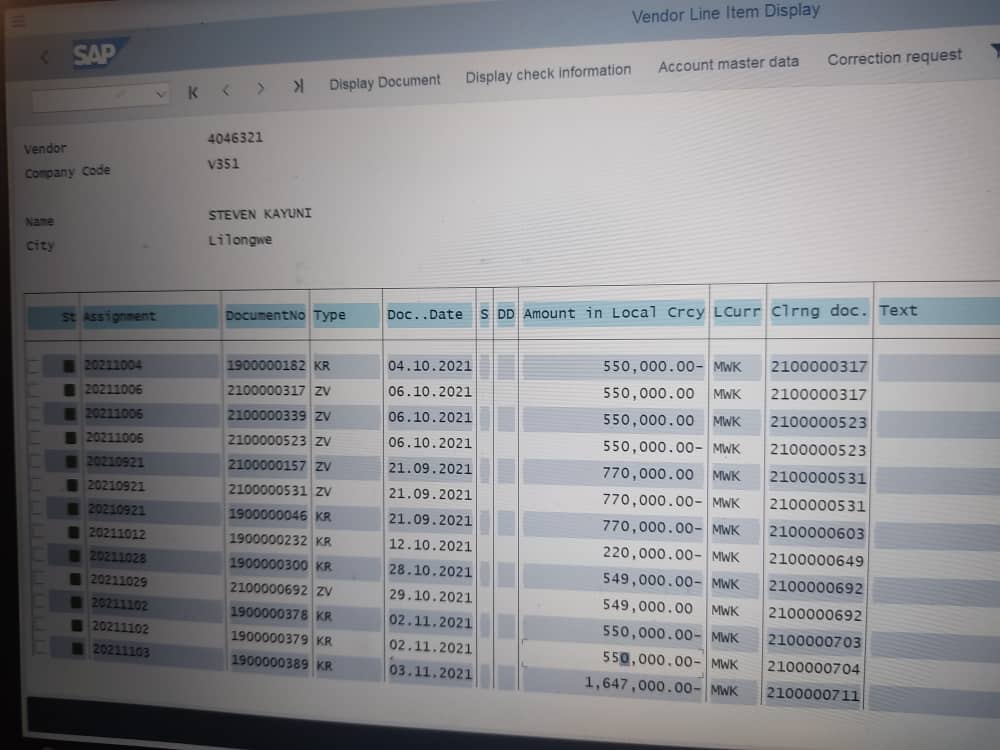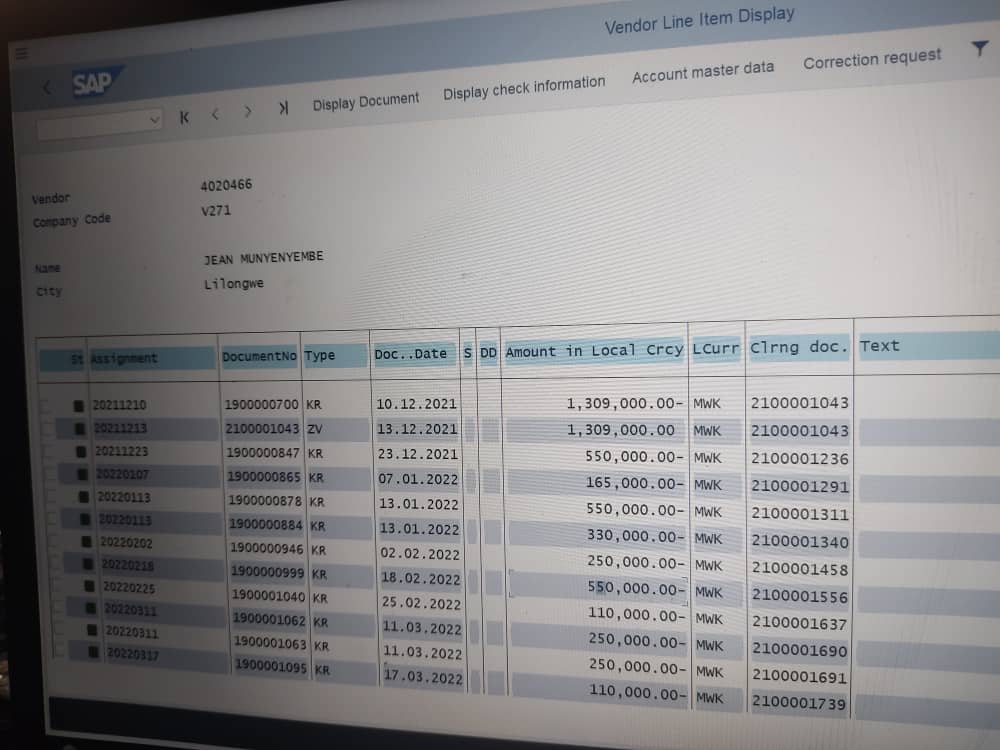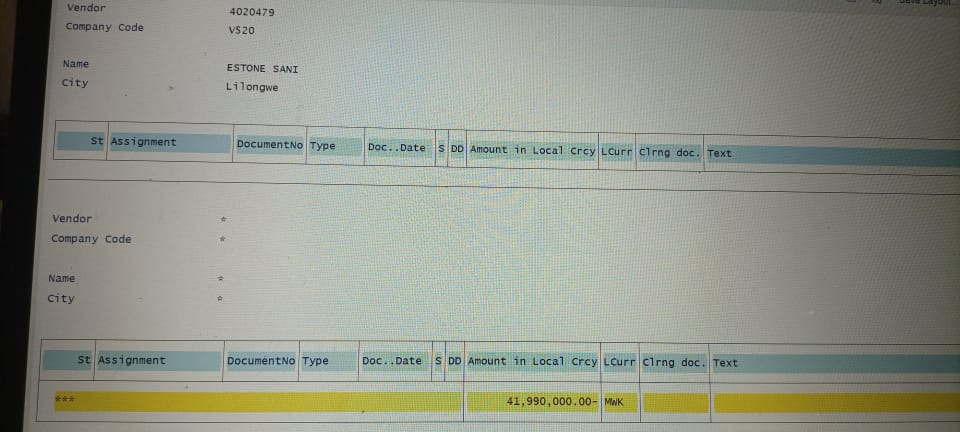1. BRIEF BACKGROUND

The spate of arrests of accountants at the Accountant General (AG’s) department, who are accused of defrauding government huge sums of money, starting from early June 2022, has brought a lot of questions than answers. This prompted the CDEDI to launch an investigation.
Quick facts of the matter are that on 25 June 2022, the Ministry of Finance released a press statement indicating that they were investigating irregular transactions at AG’s department, adding that the investigations had exposed what they termed as ‘fraudulent activities perpetrated by personnel in the department for personal gain’.
However, the said press statement did not disclose the nature of the ‘fraudulent’ transactions on one hand, but media reports on the other hand are indicating that accountants at the AG’s department were conniving with fellow accountants from other ministries and departments to syphon money from account no. 1 through allowances.
So far, 18 accounts officers have been arrested. The 18 comprise 4 principal accountants, 8 accountants, 5 assistant accountants and one intern. From this list, it is crystal clear that all these are junior officers in government.
Therefore, at this stage it is safe to conclude that no senior officer from the level of chief accountants, deputy directors, directors and controlling officers has been arrested in connection with this matter, a development that has raised eyebrows.
2. GREY AREAS
For starters, all government money is kept in Account No.1 at the Reserve Bank of Malawi (RBM).
Secondly, it is important to emphasize that there are legally binding procedures that need to be followed in order to draw funds from account number one. Thus far, one may be tempted to ask the following questions:
1. How are allowances processed in the IFMIS to the point of drawing public money from account no.1 into personal accounts at a commercial bank?
2. Is our national purse so vulnerable such that an accountant can draw from there on their own?
3. If so then, who else is drawing money on their own behind the taxpayers’ backs?
3. LEGAL PROVISIONS
The Public Finance Management Act (PFMA) of 2022, Section 6 (1) (b) says… The Treasury shall receive, receipt, keep, manage and disburse public funds and public money; (e) manage the Consolidated Fund;
According to the aforementioned act, the treasury comprises the Minister of Finance, The Secretary to the Treasury (ST) and the Accountant General. The trio is responsible for management of tax payers’ money. They do this by putting in place guidelines and mechanisms for processing payments and drawing funds from the Account no.1.

Section 9 (1) (b) of the same PFMA says… the ST shall formulate Treasury Instructions prescribing standards for budgeting, accounting, internal auditing and classification system for public resources.
The above section takes us to another set of questions:
1. What are the guidelines/operating standards in the Treasury Instructions for making an allowance payment?
2. How were these guidelines/operating standards breached by these accountants?
3. How did internal audit and compliance services perform their duties in the payment of these allowances? Did they certify or they were bypassed?
4. Is it possible for Accountant General to pay transactions that have bypassed these checks protocols?
Section 12 (1) (b) of the PFMA says… the AG shall develop, implement, monitor and evaluate accounting systems, policies and guidelines in accordance with this Act or any other written law for the proper management of public resources; (c) ensure safe custody of public money; (f) prepare, pay and account for government expenditure; (i) manage government bank accounts, including banking and payment systems;
At this juncture, it is clear that the AG prepares desk instructions to operationalize the Act; provides guidelines for safe custody of funds and making payments; on top of managing all government bank accounts.
Briefly, desk instructions talk about supporting documents to accompany payment requests to the Accountant General. They also put emphasis on duly signed documents by controlling officers or senior officers on delegated basis.
Now, at this material time, one would ask the following questions:
1. Did the allowances received by these accused accountants fall short of these water tight standards?
2. If so, then how was this possible?
3. If not, then it is obvious the AG authorised the payments; why then has she not been picked by the law enforcement agencies for questioning?
It is important at this level to point out that the AG is the administrator of the whole government accounting system called IFMIS.
Now, what are the guidelines for processing payments in the IFMIS and who is the final authority when it comes to approving payments in the system?
Section 14 (1) (f) says… A controlling officer shall, ensure that all expenditure, is properly authorized and applied to the specific purposes for which it is appropriated; (h) all expenditure is incurred with due regard to economy, efficiency, effectiveness and the avoidance of waste.
Based on this legal responsibility, the following questions need to be answered:
1. Did some controlling officers sleep on the job?
2. What are the legal consequences for this lapse in the checks and protocols?
3. If the controlling officers did not authorize the payments, and yet money was moved from the account no. 1, do these senior officers deserve to still remain in the office?
4. How were these funds accounted for by these senior officers in their financial statements submitted to the Auditor General?
5. How did the payment requests get the approval of pre-audit officers?
6. Why did the accountant general authorize payment instructions in the system to the Reserve Bank of Malawi?
4. CDEDI’S FINDINGS SO FAR
In the course of carrying out this exercise, it was discovered that government has a rigorous payment process comprising seven layers, the final one being the compliance unit. It is against this background that the CDEDI refuses to believe that a watertight process as this one, can be manipulated in favour of junior staff only! The CDEDI investigations have revealed the following information:
1. All the junior officers that have been arrested so far, only deal with encrypted data that cannot be tampered with, otherwise the IFIMS system declines to load any data that has been tampered with.
2. The arrests were reportedly targeting supper users of the new IFIMIS who underwent training in South Africa, as Trainer of Trainers (ToTs), where they accumulated legitimate allowances, and they were tasked to train others back home.

3. The allowances scandal is reported to have started with the accumulation of payment vouchers at the AG’s front office, which is manned by an officer by the name of Eston Sani, who allegedly accumulated huge sums of money in allowances from almost all the departments and agencies as a token of appreciation for handling the payment vouchers that accumulated in July and August 2021.
4. The front officer Sani, whose rate is MWK40,000 per night, is reported to have claimed the token of appreciation in the following manner: 32 nights from vote 351 sampled as follows – on 21 February 2022, MWK480,000; 21 March 2022, MK400,000; and 5 May 2022, MWK400,000; whose reference numbers are as follows: 2100072286; 2100089941; and 2100120663 respectively.
5. The 32 nights were reportedly paid from vote 351 whose controlling officer is the Director of Public Prosecutions (DPP) Dr. Steve Kayuni.
6. The new Director of IFIMS Felix Zagwazatha Sato, who was seconded to the AG’s office from the Reserve Bank and reported for duties in mid-March 2022, is alleged to have accumulated MWK7.2 million, which translates to 144 nights, when he has just been at the AG’s office for 4 months. If we take his rate to be at MWK50,000 per night, and put an average of 24 working days per month, it means he has spent 6 months outside his duty station. It is important to note that this is an officer that was seconded to strengthen the department after clearing the ‘rabble’ and the ‘cadets’ at the AG’s department.
7. Between September 2021 and June 2022, the acting AG, Jean Munyenyembe, is reported to have accumulated MWK11.7 million in allowances, which translates into 214 nights. This simply means from October to June, a period of 9 months, she spent almost all the nine months out of her office in Lilongwe. This is contrary to her role as a desk officer who makes final approvals of government payments in the IFIMS.
8. Information is indicating that in March 2022, the acting AG had a total of 64 nights in allowances, paid at a local rate of MWK55,000.00 per night; 3 nights paid at the external rate. How can a very senior officer be out of the office for 64 days in a month? Now the question is who was approving and managing government payments all these three months while the AG was out of the office?
9. It is alleged that the Director of Public Prosecutions Dr. Steve Kayuni claimed a total of 372 nights in a calendar year of 365 days, and accumulated MWK20, 475,000.00 in the process, using vote number 351, where he draws allowances from, between September 2021 and June 2022. This can be narrowed down into 134 nights in March, where four vouchers were paid in his favour on March 25, 2022 alone; 69 nights in May 2022; and 34 local and 3 external travel allowances in October 2021.
10. Reports further indicate that soon after his appointment into cabinet, Hon. Albert Mbawala was reportedly paid MWK4 million on January 28, 2022, to enable him settle down, when the revised conditions of services for the cabinet ministers and their deputies do not have that kind of allowance. It is alleged that while serving as a member of the Public Accounts Committee (PAC) of parliament, prior to his appointment into cabinet, Hon. Mbawala claimed external travel allowances amounting to MWK2.6 million to audit embassies. This begs the question as to when did the Members of Parliament start to assume the roles of auditors?
11. Human Resource officer at the AG’s department Grace Mponela, is alleged to have accumulated MWK10 million at the rate of MWK40, 000 per night, which translates into 259 nights. Now who was managing the human resource issues in all these months she was outside her office?
12. In the same period under review, Malawians may wish to know that the Minister of Information, Hon. Gospel Kazako, is reported to have accumulated MWK13.4 million in allowances. This is just a snapshot of information that is still trickling through, and the CDEDI will continue compiling the data, since the investigations are still on- going.
5.0 CDEDI’S POSITION ON THE MATTER
i. If the findings of this exercise are anything to go by, then the accountants cannot draw money from Account no. 1 on their own. In an unlikely event that this indeed happened, then the AG, the ST and controlling officers would be the biggest failures and not fit to be in those offices, and to put it bluntly, they deserved to be arrested first!
ii. It is a very well-known fact that there is a culture of allowances everywhere in the public sector. Top government officials benefit by obtaining obscene cuts from the very limited national cake. The situation at hand is subjecting junior civil servants to undeserved torture just because they powerless.
iii. Taking into consideration all these findings, we suspect these arrests are being done in order to divert people’s attention from the real issues such as the alleged high profile Zuneth Sattar corruption scandal, as well as the collapsing economy under the Tonse Alliance government.
6.0 CDEDI’S DEMANDS
i. No further arrests should be made until the Minister of Finance releases allowances data for every public officer beginning from senior most, including cabinet ministers to the junior officers.
ii. The fiscal police should immediately arrest all controlling officers who approved all dubious accumulated and unjustified allowances that led to the recent spate of arrests.
iii. The ST and the AG should publicly defend their competence in safeguarding public funds, or they should honourably resign before being forced to do so. resign from their positions on grounds of incompetence and criminal negligence.
Malawians are tired of lies and mediocrity! As Justice John Bosco Katutsi, former head of the Anti-Corruption Court of Uganda once said this during a ruling in which he convicted an engineer who was involved in the Commonwealth Heads of Government Meeting scandal in 2010… “This court is tired of trying tilapias when crocodiles are left swimming.” We demand full justice.



Well done Namiwa. Tikufuna anthu oganiza bho choncho to save this Nation. Finance Minister should indeed explain this to us. So anthu oyenera kuteteza chuma cha amphawi akungogawananso who will save us then?😭😭😭😭 Malawi